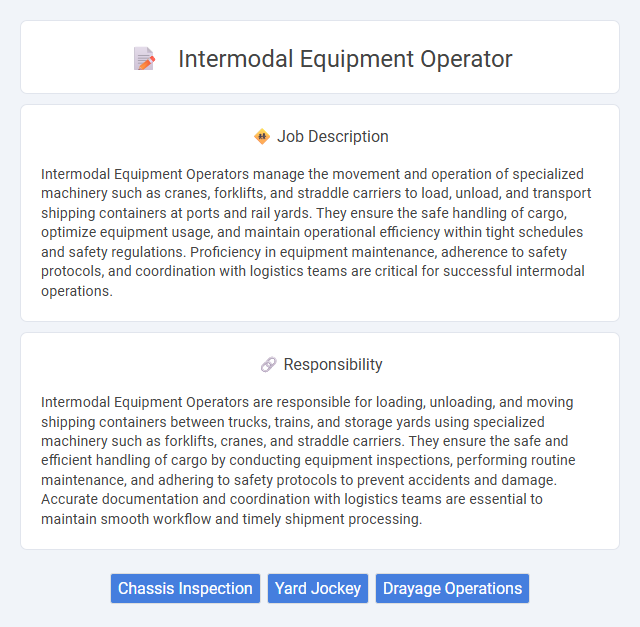
Intermodal Equipment Operators manage the movement and operation of specialized machinery such as cranes, forklifts, and straddle carriers to load, unload, and transport shipping containers at ports and rail yards. They ensure the safe handling of cargo, optimize equipment usage, and maintain operational efficiency within tight schedules and safety regulations. Proficiency in equipment maintenance, adherence to safety protocols, and coordination with logistics teams are critical for successful intermodal operations.
Individuals with strong physical stamina and the ability to work in outdoor or industrial environments are likely suitable for the Intermodal Equipment Operator role. Those comfortable with operating heavy machinery and following strict safety protocols may find a good fit in this job. People who prefer routine and structured tasks might have a higher probability of success in this position.
Qualification
Intermodal Equipment Operators must possess a high school diploma or GED along with specialized training in operating heavy machinery such as cranes, forklifts, and reach stackers. Certification in equipment operation and knowledge of safety protocols, including OSHA regulations, are crucial for minimizing workplace hazards. Experience in logistics or shipping environments enhances an operator's ability to efficiently manage cargo loading and unloading processes.
Responsibility
Intermodal Equipment Operators are responsible for loading, unloading, and moving shipping containers between trucks, trains, and storage yards using specialized machinery such as forklifts, cranes, and straddle carriers. They ensure the safe and efficient handling of cargo by conducting equipment inspections, performing routine maintenance, and adhering to safety protocols to prevent accidents and damage. Accurate documentation and coordination with logistics teams are essential to maintain smooth workflow and timely shipment processing.
Benefit
Intermodal Equipment Operators likely experience competitive wages and comprehensive benefits that enhance job security and financial stability. They probably gain access to health insurance, retirement plans, and paid time off, which contribute to overall well-being. Opportunities for skill development and overtime pay may also be common advantages in this role.
Challenge
The Intermodal Equipment Operator role likely involves managing complex logistics and operating specialized machinery in fast-paced environments, presenting significant challenges. Navigating tight schedules and coordinating between various transportation modes may require strong problem-solving skills and adaptability. These challenges probably demand continuous attention to safety protocols and efficient equipment handling to maintain smooth operations.
Career Advancement
Intermodal Equipment Operators play a crucial role in managing and transporting shipping containers between different modes of transportation, such as ships, trucks, and trains. Career advancement opportunities include promotion to supervisory roles, logistics coordination, or specialized equipment operator positions, enhancing both responsibility and salary potential. Gaining certifications in heavy machinery operation and logistics management significantly boosts prospects for leadership and technical expertise within the transportation and supply chain industries.
Key Terms
Chassis Inspection
Intermodal Equipment Operators specializing in chassis inspection ensure the structural integrity and operational safety of trailer chassis by conducting thorough checks for damages, wear, and mechanical issues. They document inspection findings, report defects, and coordinate necessary repairs to maintain compliance with industry safety standards and regulatory requirements. Proficient in using diagnostic tools and safety protocols, these operators play a crucial role in preventing equipment failures and enhancing the efficiency of intermodal transportation operations.
Yard Jockey
A Yard Jockey, also known as an Intermodal Equipment Operator, specializes in moving trailers and containers within rail yards, ensuring efficient loading and unloading processes. Proficient in operating terminal tractors and yard trucks, they coordinate container placement to maximize storage space and streamline intermodal transfer operations. Expertise in safety protocols and equipment maintenance is essential to minimizing delays and optimizing yard productivity in fast-paced logistics environments.
Drayage Operations
Intermodal Equipment Operators specialize in managing drayage operations, efficiently transporting shipping containers between ports, rail yards, and warehouses. Their expertise ensures timely, safe loading and unloading of cargo using equipment like chassis, forklifts, and container movers. Optimizing drayage workflows reduces transit times and operational costs, crucial for seamless supply chain management.
 kuljobs.com
kuljobs.com